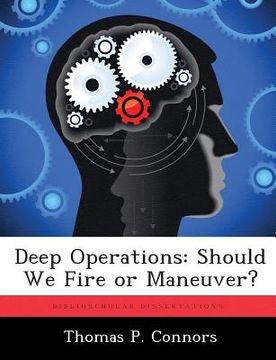Share
Deep Operations: Should We Fire or Maneuver? (in English)
Thomas P. Connors
(Author)
·
Biblioscholar
· Paperback
Deep Operations: Should We Fire or Maneuver? (in English) - Connors, Thomas P.
$ 48.80
$ 57.95
You save: $ 9.15
Choose the list to add your product or create one New List
✓ Product added successfully to the Wishlist.
Go to My WishlistsIt will be shipped from our warehouse between
Monday, July 15 and
Tuesday, July 16.
You will receive it anywhere in United States between 1 and 3 business days after shipment.
Synopsis "Deep Operations: Should We Fire or Maneuver? (in English)"
Current doctrine considers operational fires as the primary deep strike option. The purpose of this monograph is to determine if operational fires or operational maneuver should be the primary means for conducting deep operations in every situation. Two possible scenarios are considered for a Warsaw Pact attack against NATO. The first scenario is an attack after complete mobilization, consisting of two strategic echelons composed of two operational echelons. The second scenario is a surprise attack after 72 hours of preparation by the Warsaw Pact, consisting of one operational echelon. Although deep operations are a function of many variables, for the purposes of this study only logistics requirements are compared to logistics capabilities. Specifically, the criteria for determining feasibility is whether or not the deep attack force can be armed and fueled throughout the mission. The overall approach is to compare logistics requirements for deep attack to current logistics capability to support a deep attack maneuver force. The first step is to look at the theory and doctrine behind deep operations. Next, an examination is made of the enemy situation on which current doctrine is based; the multiple echelon scenario. This is done to determine logistics requirements for deep Operational maneuver given this scenario. These requirements are then compared to current logistics capabilities to determine feasibility of deep attack by a specific size maneuver force. Similarly, the surprise attack scenario is analyzed to compare requirements to capabilities. This study finds that deep operational maneuver is not logistically supportable in the first scenario. However, in the second scenario capabilities meet deep maneuver requirements. The overall conclusion is that neither operational maneuver nor operational fires should hold a dominant position in current doctrine.
- 0% (0)
- 0% (0)
- 0% (0)
- 0% (0)
- 0% (0)
All books in our catalog are Original.
The book is written in English.
The binding of this edition is Paperback.
✓ Producto agregado correctamente al carro, Ir a Pagar.

